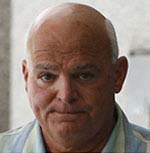The International Atomic Energy Agency confirmed that Iran last week produced its first batch of 20% enriched uranium, constituting the country’s first batch of HEU (highly enriched uranium). HEU is used in some reactors as fuel, like fast neutron reactors and some naval reactors that power submarines. Its primary use, however, is for weapons. A typical nuclear bomb uses 85% enriched uranium or plutonium, but many experts agree that 20% enriched uranium is weapons-usable. Also, the technical skill required to get to 20% is all that is really necessary to get to 85%. It just takes more time.
So what is all this talk about enrichment anyway? Enrichment is necessary to get the fissile isotope of uranium (U-235) separated from the far more common but mostly useless U-238 isotope (though U-238 is useful for making plutonium). Basically you’ve got to refine it using a gas centrifuge. Uranium gas is pumped into a cylinder that rotates at high speed, and this action extracts the U-235 from the U-238. This takes a while, so it makes sense to build as many centrifuges as possible that can work in parallel. While reports say that Iran’s centrifuge design and capability are inferior to the West’s, improvement is happening all the time. Better and better centrifuge designs are coming online.
Then the news broke yesterday that the IAEA has concrete evidence that Iran is either currently working on or is hiding the remnants of a nuclear bomb program. These major moves by Iran show exactly how far they have come, on their own, in the nuclear game.
And boy is Russia pissed.
“For about 20 years, the Iranian leadership carried out its clandestine nuclear program without reporting it to the IAEA,” said said Russian Foreign Minister Sergei Lavrov durign an interview at the Ekho Moskvy radio station in Moscow. “We are very alarmed and we cannot accept this, that Iran is refusing to cooperate with the IAEA.”



